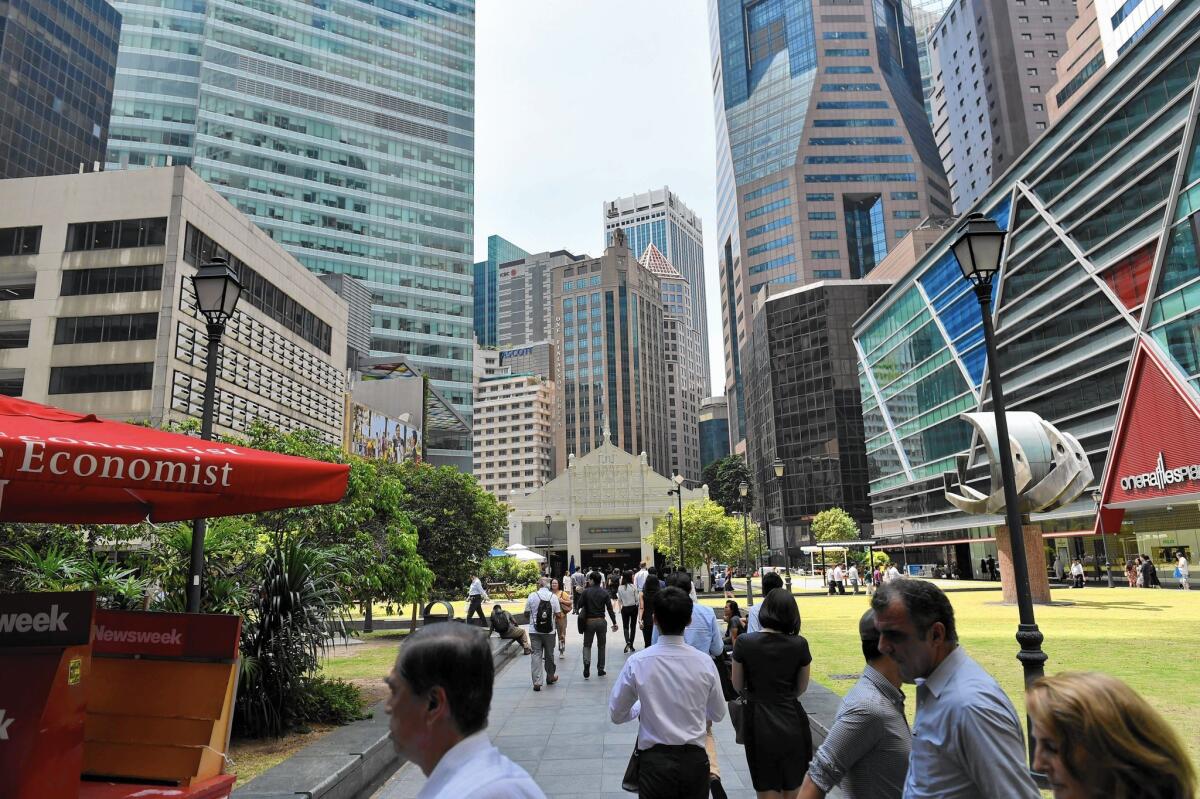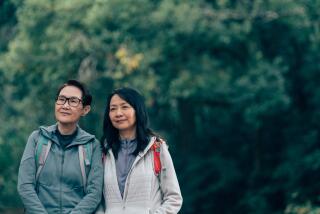With orderly Singapore turning 50, citizens may see a freer society

Reporting from Singapore â This former British colony of 5.5 million people bustles in a uniquely orderly way. The banyan-shaded boulevards are teeming, but never too crowded. Street-food vendors are corralled into designated centers. The occasional flatbed truck, loaded with a dozen laborers, whizzes past omnipresent Mercedes-Benzes.
An economic miracle built on Southeast Asian marshland, Singapore boasts the worldâs eighth-highest per capita income â $55,200, according to the International Monetary Fund. But politics are monopolized by one party, and surveys by human rights groups such as Freedom House say Singapore does not have a free press and even its Internet is only partly free.
This summer the strictly run city-state will mark its golden jubilee of independence. In Singaporeansâ characteristic penchant for corporate-style acronyms, the milestone is being called SG50: a tidy shorthand that masks the rumblings of discontent the government is facing â and fighting.
Some signs indicate that business may not carry on as usual at Singapore Inc. much longer.
Long-ailing founding father Lee Kuan Yew, 91, is hospitalized and on a ventilator, and his son, Prime Minister Lee Hsien Loong, 63, recently battled a second bout of cancer and has signaled plans to step down after his next term. Some hope a changing of the guard could bring an end to the Lee style of strongman politics.
The elder Lee served as prime minister until 1990, and then senior minister and âminister mentorâ after that. His Peopleâs Action Party, or PAP, which has ruled for five decades, continues to dominate and still brooks no dissent.
But a new generation of ever more self-assured Singaporeans, who donât have firsthand memories of the elder Leeâs 31-year rule and of the countryâs traumatic founding, are seeking to shape its future with bolder and more diverse voices.
âThe tacit social contract has been political stability and economic growth in exchange for a curtailment on freedom and political rights,â said Lam Peng Er, senior research fellow at National University of Singaporeâs East Asian Institute. âWhat Singaporeans need is a new social contract.â
In the 1950s, after the end of World War II, Singapore was released from British rule but eventually sought refuge in a federation with neighboring Malaysia, only to be expelled in 1965 as a result of race riots and political fights.
On its own with few natural resources, the port at the tip of the Malay Peninsula evolved from a British naval base into a tiny nation underpinned by a multilingual ethos, where an ethnic Chinese majority and sizable Indian and Malay populations coexist.
Singaporeâs government is structured as a parliamentary democracy, with a largely ceremonial presidency. But the PAP has dominated politics since the countryâs founding. Under PAP stewardship, Singapore blossomed into the little economic engine that could.
Besides serving as a banking and logistics service hub, the country rakes in substantial income from oil refining, shipbuilding and biotechnology. Its technocrats govern on a âjust trust usâ paradigm, while most citizens are seen as compliant compatriots devoted to making money.
In its defense, Kishore Mahbubani, whose 33 years in government included a stint as ambassador to the United Nations, said in a recent interview with foreign reporters, âFrom day one, Singapore paid attention to the social needs of its people: from housing to healthcare, from education to the environment.â
For all this, PAP has been reaping the yield at the ballot every five years. But its rampant electioneering and gerrymandering may have deprived opposition parties of a better chance at winning more than six seats out of the 87 in Parliament.
Reports from historians and human rights organizations have documented a government prone to muster tools such as forced exile, the national security apparatus and bankrupting defamation lawsuits to muffle opponents.
âPeople are questioning if itâs necessary,â said Braema Mathi, a public advocate and former journalist who served in Parliament. âWhy put up such a big sledgehammer?â
Mathi, now a consultant, described the governmentâs attitude as âWe watch you, but weâre not eager to engage you.â
Even well-meaning attempts to engage the public get twisted amid an overarching impulse for control.
The government in 2000 designated a free-speech area, called Speakersâ Corner, in a public park. But officials then stepped in with onerous regulations and even surveillance cameras.
Many are wary of rocking the boat.
âPeople want the PAP to stay in power because it has delivered the goods,â said Catherine Lim, a romance novelist-turned-political commentator.
Lee family members and PAP stalwarts control major institutions in Singapore, such as the sovereign fund, the telecommunications company and the universities. So even when Lee Hsien Loong steps aside, Lim says, that wonât necessarily be a harbinger of real change.
Some have begun agitating. The Pink Dot movement, which campaigns for equal rights for gay, lesbian, bisexual and transgender people, drew 26,000 people to its largest-yet rally protesting constitutionally sanctioned discrimination.
And since late 2013, a movement called Free the Internet has beat back legislative proposals to regulate websites.
For now, the government uses its legal cudgel to clamp down on freewheeling views. After calling for transparency on how the countryâs pension fund is run, blogger Roy Ngerng was sued by the prime minister for libel.
Former opposition leader Chee Soon Juan of the Singapore Democratic Party was bankrupted by suits from the Lees. Chee, though, was not silenced; he recently wrote a commentary in the Wall Street Journal.
Whether resistance will turn into critical mass remains to be seen.
âPeople here think they canât beat the government, so theyâre afraid to take on the government,â said Remy Choo. As one of the few public-interest lawyers in the country, Choo believes a nation derives its strength from bolder voices.
As a law student at New York University in 2007, he co-founded a local news and commentary website for Singapore, the Online Citizen, to provide an alternative to national newspapers, all of which are controlled by the government and business elites through licensing and shareholding requirements.
Choo and like-minded activists are collecting alternative narratives on the occasion of the golden jubilee, including stories from political prisoners, low-wage workers, and gay and lesbians.
âI want to move away from the discourse of fear of the government,â he said. âA lot of fear has to be dispelled by our example.â
Law is a special correspondent. Times staff writer Julie Makinen in Beijing contributed to this report.
More to Read
Sign up for Essential California
The most important California stories and recommendations in your inbox every morning.
You may occasionally receive promotional content from the Los Angeles Times.










